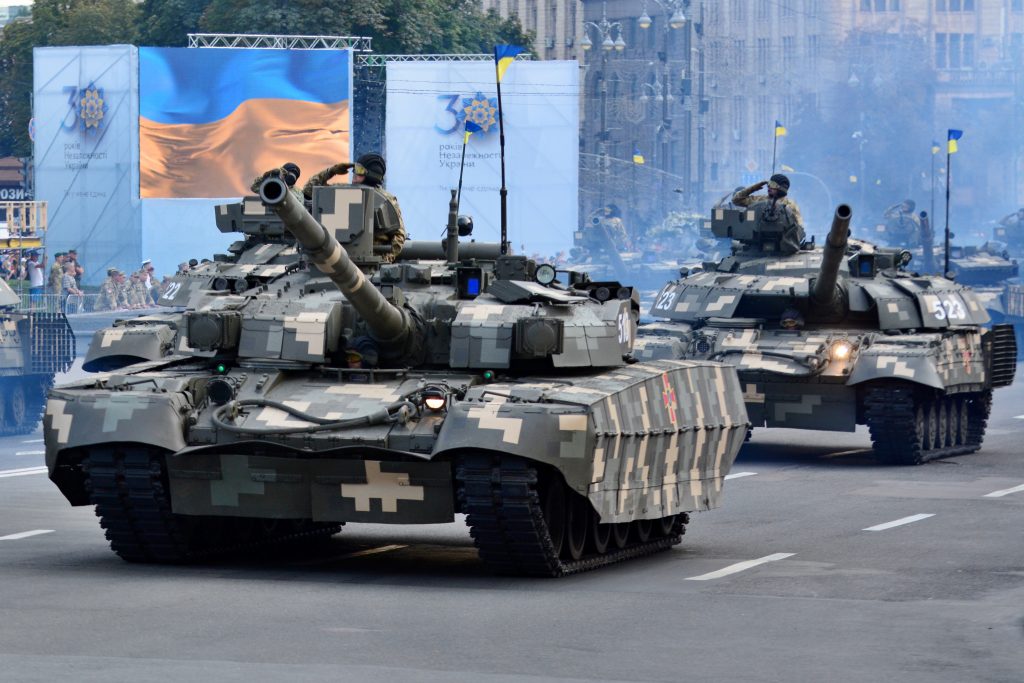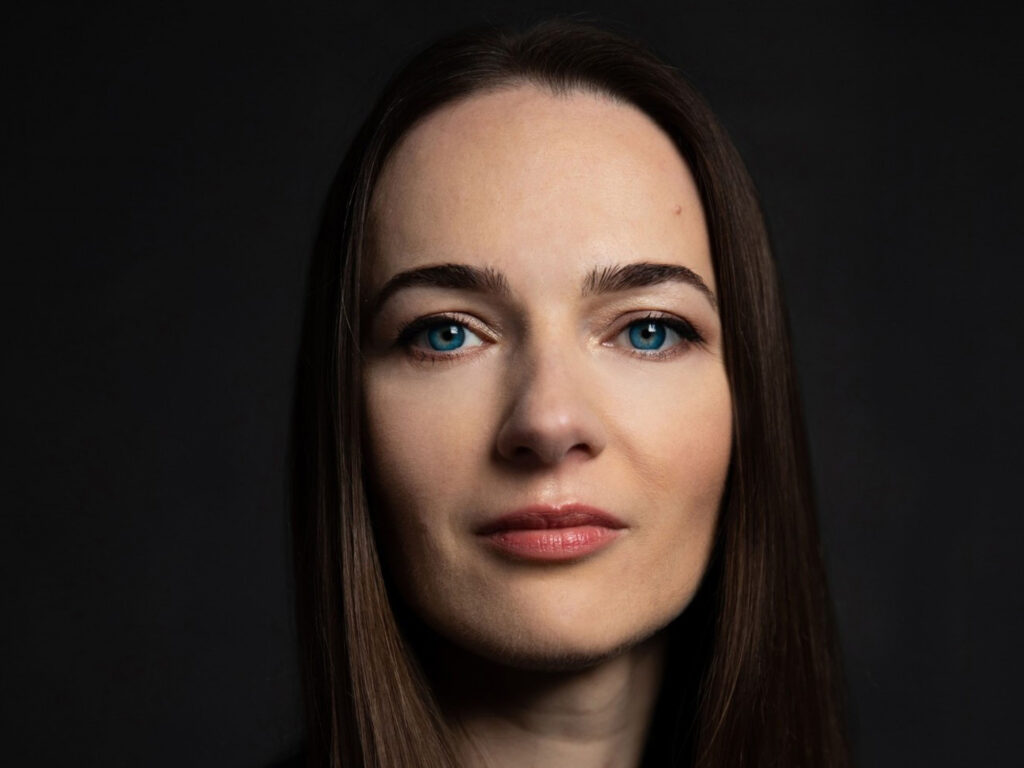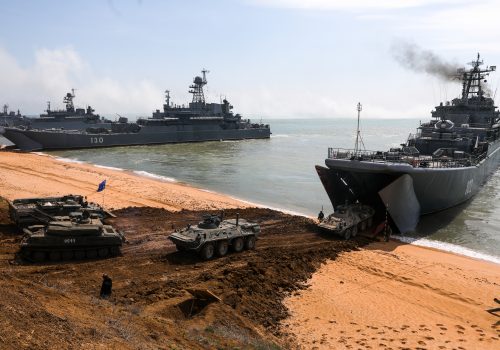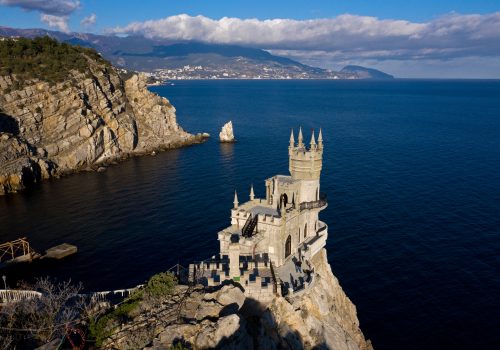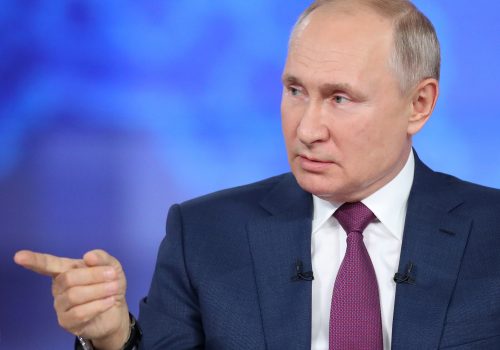Ukraine’s ongoing split from Russia ranks as one of the most consequential European events since the collapse of the USSR 30 years ago. During more than seven years of armed conflict, this bitter and bloody separation has cost over 14,000 lives and forced millions of Ukrainians to flee their homes. It has sent shock waves through the wider region and plunged the entire world into a new Cold War. But is the geopolitical divorce between Russia and Ukraine now final, or could Moscow still potentially force Kyiv back into the Kremlin orbit?
Signs of growing tension between the two newly independent nations were evident throughout the first two decades of the post-Soviet era, with Ukraine’s 2004 Orange Revolution serving as a particularly important milestone in the deteriorating relationship. The final collapse in bilateral ties came in early 2014, when Russia responded to Ukraine’s Euromaidan Revolution by occupying Crimea and attempting to orchestrate pro-Kremlin uprisings in Ukrainian cities across the south and east of the country.
More than seven years on, the two countries remain locked in an undeclared low-intensity war with little prospect of any progress towards a sustainable peace settlement. Russia continues to occupy Crimea and much of eastern Ukraine’s Donbas region, but has seen its influence decline to historically unprecedented lows throughout the rest of Ukraine.
Thanks to a combination of rising anti-Kremlin sentiment and the effective disenfranchisement of Moscow-leaning electorates in occupied eastern Ukraine and Crimea, Ukraine’s formerly formidable pro-Russian political parties have seen support plummet from traditional levels of 40-50% to below 20%. This decline has been mirrored in other sectors including business, the media, and popular culture. Russia has lost its longstanding position as Ukraine’s dominant trade partner and currently finds itself more excluded from Ukrainian daily life than at any time in over three centuries.
Despite these setbacks, Vladimir Putin has stubbornly refused to reverse course on Ukraine and appears committed to maintaining the current confrontation indefinitely.
Putin’s apparent obsession with Ukraine dates back to his disastrous intervention in the country’s 2004 presidential election, which played a key role in sparking the Orange Revolution and was widely seen as a personal humiliation for the Russian leader. The most recent evidence of Putin’s Ukraine fixation was a 5,000 word essay on the “historical unity” of Russia and Ukraine published in July 2021 that pushed the imperialistic notion of Russians and Ukrainians as “one people” and bizarrely claimed Ukraine could only be “truly sovereign” in partnership with Russia.
When Ukrainian President Volodymyr Zelenskyy first came to power in spring 2019, he expressed hopes that he could sit down face-to-face with Putin and reach a reasonable compromise to end the conflict. However, Zelenskyy’s efforts have met with little but intransigence and further hostility from the Kremlin. In a recent interview with the Washington Post, the Ukrainian leader was forced to admit that when it comes to Ukraine, Putin is sometimes simply “too emotional.”
As Ukraine marks three decades of independence, the Atlantic Council invited a range of experts to share their views on the future of Russian-Ukrainian relations and asked whether the geopolitical split between the two countries is irreversible.
Daniel Fried, Distinguished Fellow, Atlantic Council: Is the current geopolitical split between Ukraine and Russia irreversible? Few things are truly irreversible, but Putin is doing a lot to encourage Ukraine’s national identity to crystalize in opposition to Russia. According to Russian nationalist ideology, the Ukrainian nation does not exist except as a sort of little brother tied and subordinate to Russia. That’s the argument Putin made in his July “article” about Ukraine. It is an extreme view (and offensive to lots of Ukrainians), but there is a basis for deep Russian-Ukrainian partnership. A different set of Russian policies toward Ukraine over the past 30 years of Ukrainian independence might have nurtured it.
Instead, Putin pursued policies that were hostile to Ukraine’s national interest, as Ukrainians seemed to define it. In the most spectacular example, Putin aligned himself with the corrupt, Kremlin-friendly Ukrainian politician Viktor Yanukovych, but then forced Yanukovych to break his promise by refusing to sign an EU-Ukraine Association Agreement in 2013 that was widely popular in Ukraine. This triggered protests in Kyiv that led to Yanukovych’s ouster, which then sparked Putin’s invasion of Ukraine, the annexation of Crimea, and a war still ongoing in the east of the country that has alienated Ukrainian opinion. Ukrainians are now far more pro-NATO and anti-Kremlin than would have been the case otherwise. Ukrainian patriotism today means resisting Kremlin attacks.
Putin’s actions, so damaging to Russia-Ukraine relations, have a logic, but a bad one. Putinism, a system of authoritarian kleptocracy, keeps Russia economically backward as a value-extracted rather than value-added economy. That relative backwardness leaves the system vulnerable to challenge from within (see Putin’s nervous and hostile treatment of anti-corruption activist and now political prisoner Alexei Navalny). It therefore puts a premium on keeping foreign influences, especially from Western democracies, far away.
If Ukraine succeeded in becoming a free market, rule-of-law, democratic success story, as various Ukrainian leaders have promised, it would stand as a rebuke to Putinism. Putin, who seems to hate pro-democracy “color revolutions” even more than he hates NATO, probably knows this and will try to prevent it. Therefore, Putin stands against what Ukrainians seem to want. While Putinism remains Russia’s system, Russia and Ukraine will remain at odds.
James Sherr, Senior Fellow, Estonian Foreign Policy Institute at the International Centre for Defence and Security, Tallinn: Only great floods and great wars produce irreversible changes. Thirty years after the Russian Federation recognized Ukraine’s independence, Moscow continues to see itself as the ultimate authority over what this independence means in practice. In 2014, Ukraine’s refusal to accept Russia’s authority led to a war that shows no sign of ending. Nevertheless, Vladimir Putin has given Ukrainians a rigorous education in nationhood.
For Ukraine’s president, Volodymyr Zelenskyy, the war has been a rite of passage into political adulthood. This year, he moved the political earth by doing what no previous Ukrainian president had found the courage to do: dispatching Putin’s main Ukrainian ally and accomplice, Viktor Medvedchuk, into the wilderness.
Yet the earthquakes generated by Washington’s recent reversals over Nord Stream 2 and Afghanistan could have more lasting consequences. That certainly is the view presented by the current Secretary of the Russian Federation Security Council, Nikolay Patrushev, who on 19 August warned Ukraine to prepare itself for betrayal and desertion by its closest ally, the United States. Patrushev is no dispassionate observer, but even if he were silent, the reverberations of these events would still corrode Ukraine’s confidence until Washington realizes how much is at stake. Ukrainians are at their strongest when they realize that “we have nobody to rely upon but ourselves.” But Ukraine’s statehood is most imperiled at such moments.
Stay updated
As the world watches the Russian invasion of Ukraine unfold, UkraineAlert delivers the best Atlantic Council expert insight and analysis on Ukraine twice a week directly to your inbox.
Maria Snegovaya, Nonresident Fellow, Atlantic Council: The current geopolitical split between Ukraine and Russia is directly due to the position of the Russian leadership. The shock and trauma felt by Ukrainians as a result of Russia’s invasion, the annexation of Crimea, and the ongoing war in eastern Ukraine will remain for a long time and have fueled negative attitudes towards the Kremlin among a majority of the Ukrainian population. Meanwhile, last year’s amendments to the Russian Constitution have left little room for doubt that Putin will remain in power until 2036, so there is no reason to expect any change in the tone of bilateral relations for the foreseeable future.
Ukraine is of crucial importance to Putin. In his recent history essay on the “historical unity” of Russians and Ukrainians, Putin made clear once again that he does not believe in the existence of an independent Ukrainian nation. Instead, he views Ukraine as a key battlefield in his geopolitical struggle with the West. As long as Putin is in control, Moscow’s current aggressive policies towards Ukraine will continue, and so will the split between Ukraine and Russia.
Andriy Zagorodnyuk, Chairman, Centre for Defence Strategies: I am convinced that following the 2014 Revolution of Dignity, and especially as a result of the ongoing war in eastern Ukraine, most Ukrainians have turned decisively away from the idea of close ties with Russia. A majority of Ukrainians regard Russia as responsible for the war and understand that the Russian authorities do not have any good intentions towards Ukraine or its people. It is also safe to say that the core values embraced by most Ukrainians are now very close to what we understand as “Western values,” while at the same time being incompatible with the principles that shape modern Russian society.
However, there are still regions of Ukraine where this rejection of Russia and Russian values is not yet so dominant. I am certain that the Russians themselves are well aware of this. Russia’s future strategy towards Ukraine will likely take this into account. Rather than seeking to force the whole of Ukraine back into the Russian sphere of influence, Moscow will look to target individual regions of the country and specific demographics in a bid to amplify internal tensions and break up Ukraine from within. This approach represents a key threat to Ukraine’s national security and must be addressed by the government.
Oleksiy Goncharenko, Ukrainian MP, European Solidarity party: The current Russian regime has no desire to restore partnership with Ukraine. Instead, the Kremlin’s goal remains to force Ukraine into the Russian sphere of influence while depriving the country of its sovereignty. I believe today’s ongoing Russian aggression against Ukraine is a good example of Prussian general Carl von Clausewitz’s famous aphorism, “war is the continuation of politics by other means.”
For more than seven years, Ukrainians have resisted Russian aggression and have made clear they refuse to become a Kremlin colony, so it looks likely that the conflict will continue until Russia renounces its imperial claims. This could only happen in two scenarios: either the Putin regime is replaced by a more democratic form of government, or the Russian Federation itself collapses, as both the Czarist Empire and the Soviet Union did in the twentieth century.
The emergence of a democratic Russia currently looks extremely unlikely. On the contrary, most observers expect Putin’s eventual successor to share his authoritarian instincts. The idea of a new Russian collapse may be marginally more plausible in light of growing dissatisfaction among local elites and the wider Russian population towards Moscow’s policies of economic stagnation, political repression, and international confrontation. Nevertheless, it would be foolish for Ukrainians to pin their hopes on a dramatic change in the Russian political climate or the convenient collapse of Putin’s regime.
For Ukraine, the most pragmatic way to address the Russian threat is to focus on winning the hybrid war. This requires significant work in terms of strengthening Ukraine’s traditional defense capabilities, but it also means enhanced diplomatic, cultural, and ideological efforts to safeguard the country’s independence.
Eurasia Center events

Paul D’Anieri, Professor of Political Science and Public Policy, University of California, Riverside: Russia can reclaim a dominant role in Ukraine only through force and subversion. The relationship that prevailed before 2014 is no longer possible. Most of Ukraine’s people and elite have rejected Russia politically and economically. They envision their future in Europe. However, three factors may thwart that ambition.
First, Europe is ambivalent at best about including Ukraine. Many European leaders would happily cut a deal with Russia at Ukraine’s expense. Germany’s election will be crucial in this respect. Second, Russia is determined to recapture Ukraine, and is patient, cynical, and willing to devote substantial resources to do so. Third, corruption in Ukraine provides both an avenue for Russian influence and a justification for Western detachment.
While Russia’s aggression has made co-opting Ukraine’s elite harder, many channels of influence remain. It is not difficult to imagine that the West, tired of supporting Ukraine and eager to strike a deal with Moscow, will pressure Ukraine to accept a deal that allows the West to move on to other concerns while Russia slowly takes over. If that happens, we will blame Ukraine’s unwillingness to tackle corruption, much as we have done regarding Afghanistan, and declare the outcome to have been inevitable.
Volodymyr Dubovyk, Associate Professor, Odesa Mechnikov National University: The schism of 2014 has had a profound impact on Russian-Ukrainian relations. Ongoing Russian aggression and the occupation of Crimea make a return to earlier levels of interaction impossible. The pro-Russian segment of Ukraine’s political spectrum has become more restrained, while public attitudes remain steadily critical of Moscow. So there is no going back to the status quo that existed prior the outbreak of hostilities in 2014.
At the same time, it remains entirely possible for Moscow to recapture some of the ground lost over the past seven years. Much will depend on the progress of the conflict in eastern Ukraine, along with the pace of Ukraine’s domestic reforms and Kyiv’s relations with the West.
As the conflict in eastern Ukraine drags on with no end in sight, it inevitably becomes part of the landscape and loses the ability to shock. Although there is little sign of this happening yet, Ukrainian society may eventually grow more susceptible to the idea that the time has come to seek some kind of resolution with Russia.
It is critical for Ukraine to maintain strong relations with the West. The danger remains that Ukraine’s Western partners may lose their appetite for cooperation, especially if Kyiv jeopardizes existing partnerships by its own inconsistent actions.
Ukraine must also be wary of domestic stagnation. A lack of palpable change and the persistence of corruption both serve to erode the post-2014 consensus. This could create potentially fertile ground for pro-Kremlin forces to promote the idea of a geopolitical turn away from Euro-Atlantic integration and back towards Russia.
Brian Mefford, Senior Fellow, Atlantic Council: The current geopolitical divide between Ukraine and Russia is sharp, but political orientations can change. Prior to the 2014 war, for example, Ukrainian support for NATO membership was only around 20 percent. After more than seven years of war, a majority of Ukrainians now back the idea of joining NATO.
Russia should also not be underestimated. Moscow is persistently working to checkmate Ukraine into returning to its sphere of influence, and Nord Stream 2 is the latest harsh move by Russia towards achieving this goal. Ukraine has shown resilience in resisting Russia’s pressure, but this resistance must be sustained over a long-term period that will likely last for decades to come.
Ukraine can best ensure its permanent separation from Russia by accelerating integration into the various structures of the European Union; by tackling internal corruption and oligarch influence; and, ultimately, by creating a higher standard of living for its citizens. When the overall quality of life in Ukraine is clearly better than the standard of living on offer for the average Russian across the border, Ukraine will have cemented its independence irreversibly.
Peter Dickinson is Editor of the Atlantic Council’s UkraineAlert Service.
Further reading
The views expressed in UkraineAlert are solely those of the authors and do not necessarily reflect the views of the Atlantic Council, its staff, or its supporters.

The Eurasia Center’s mission is to enhance transatlantic cooperation in promoting stability, democratic values and prosperity in Eurasia, from Eastern Europe and Turkey in the West to the Caucasus, Russia and Central Asia in the East.
Follow us on social media
and support our work
Image: Ukrainian tanks in downtown Kyiv during a rehearsal for the country's August 24 Independence Day parade. (Photo by Aleksandr Gusev/Pacific Press/Sipa USA)
